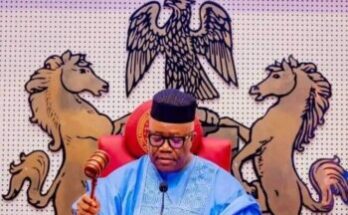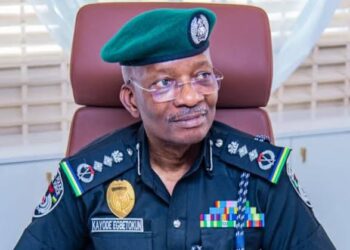Globally, it has become an established consensus that the primary purpose of any government is the protection of lives and property of citizens. This is even against the backdrop of the triumph of western liberal democracy as the dominant system of government.
In this wave of triumph of democracy, Nigeria is not left out as the giant of Africa navigates its longest democratic dispensation (1999-2024) in its 64-year history as an independent country. Specifically, the 1999 constitution (as amended) explicitly states in Section 14 (2) (b), inter alia: “The security and welfare of the people shall be the primary purpose of government.”
However, the modus operandi of implementing this vital article of our grand norm has come under scrutiny in the last decade against the background of the recalcitrant insecurity that has posed existential threat to the very foundation of Nigeria.
One of the debates that has elicited discordant tunes for the better part of Nigeria’s history is how best to police the system. The debate hasn’t stopped. However, since the coming of the President Bola Ahmed Tinubu Renewed Hope administration, the agitation for the legalisation of state police has received more impetus. These arguments have been predicated on the fact that locals know their terrains better.
At a recent dialogue on policing system in Nigeria, attended by eminent Nigerians like former President Goodluck Jonathan and former head of state, General Abdulsalami Abubakar (rtd), where President Tinubu was also represented by his deputy, Vice President Kashim Shettima, opinion of leaders seemed heavy in favour of implementation of state police as the panacea for the nation’s insecurity.
Let me state expressly that the proponents of state police have their merits. However, most of the views appear one sided. It’s like solving one problem and creating a bigger one. In my opinion, the demerit of having a State Police outweighs its advantages.
The recent seemingly hurried approach to adopting the state police is akin to putting the cart before the horse. If we say the current federal policing system is not working, in all fairness, have we put in place the full police structure? The answer is no!
Frankly speaking, there have been terrible shortfalls in the number of police recruited for a large population such as Nigeria. For instance, the United Nations recommended one police personnel to 460 citizens ratio. What this means is that Nigeria has a police-citizen ratio of 1-650. Following this calculation, the Nigeria Police requires an additional 190,000 personnel to be at parity with the United Nations recommended ratio.
Additionally, talking in terms of accoutrements, we can’t beat our chest to say our police personnel are properly kitted and adequately motivated. There’s a huge shortfall in equipping our police. In the fourth republic there has been increasing disquiet about our police personnel struggling to kit themselves.
This is strange anywhere in the world that men who put their lives on the line struggle out of their lean income to dress well to portray the image of the Nigeria Police. Let me submit that the problem is not with the police but the whole gamut of the funding and accountability system in the police hierarchy. It has never been so that the police fund their own uniforms.
Nevertheless, this does not excuse the undesirable elements and culprit elements in the police. In summation, instead of a state police, there’s the urgent need for an overhaul of the current federal police.
Lest I forget to ask this pertinent question that have been agitating the minds of many Nigerians. How come the Nigeria Police Force, NPF, that is adjudged to be performing poorly at home perform brilliantly when on international duties? Too many Nigerian police contingents have won awards and accolades on international engagements, especially United Nations duties.
Could it be that at those fora, they are exposed to proper accoutrements to work with or they drop their Nigerianess while on international duties and take it on again on their way back? These are a whole lot of questions that require answers before we begin to brandish the state police card that will sink the rest of us.
The internal security and order of the Nigerian State depends on how effective its policing system is. It’s like garbage in garbage out. We cannot expect to have an effective police system with Nigeria’s current police strength of just over 370,000 officers which is grossly insufficient for a population of 230 million people.
Besides, larger percentage of this number are deployed as personal guards to influential Nigerians, leaving the citizens with negligible number of officers to secure Nigerians. At different times, the police leadership has announced withdrawal of police attached to every Tom, Dick and Harry. This threat has never been pushed through. The police are meant to protect every citizens not only VIPs.
Let me bend back memory lane. This is not the first time Nigeria is contemplating the idea of a state police. In fact, Nigeria started out with a regional police at Independence in 1960. In the end, the decision of a regional police was roundly bemoaned because of its catastrophic outcome. The implementation of a state police system in Nigeria at this stage of its development comes with some potential drawbacks.
Here are a few of the concerns:
Abuse of power: There’s a risk that state governors might misuse the state police for personal or political gain. This could lead to human rights abuses and undermine overall security. Let’s draw our attention to the fact that states around Nigeria have established different security outfits in one form or the other. The level of human rights abuses that are being perpetrated by these outfits are mind boggling.
They exist under various guises and operate as pseudo police. Legalising these with a state police is like handing the knife and yam to the state governors. Without sounding like an alarmist, we might be laying a foundation for political crisis or instability of monumental dimensions.
Exacerbation of ethnic tensions:
State police forces could become politicised, worsening existing ethnic divisions and conflicts within the country. It could become a testing ground for cessational tendencies.
Funding:
With some governors footdragging on salary payments, how feasible will it be for them to establish a state police. It will certainly be a messy affair because it will encounter huge financial and logistical challenges. Setting up and maintaining effective state police forces would require significant resources and planning.
In my honest opinion, the President Tinubu Renewed Hope government can turnaround the fortune of the Nigeria Police by strengthening the existing federal police by more massive recruitment of able and capable hands. There should be proper insurance that will embolden officers to approach their duties with courage knowing that if anything happens to them, their families are covered.
Additionally, inter-agency collaboration must be encouraged. No matter the specification of their duties, security agencies are working for the overall safety of Nigerians and their property in keeping with Section 14 (2) (b) of the 1999 Constitution of the Federal Republic of Nigeria. The September 11, 2001 terrorists attack on the World Trade Centre and the Pentagon in the United States was largely blamed on the failure of intelligence due to inter-agency rivalry. Hence, the government must do more for our security agencies to close ranks, train and fund them adequately to carry out their assignments.
Recently, the Directorate of State Services (DSS) moved to enhance its operations with the establishment of more directorates, while other units were upgraded to full departments. The current reforms in the DSS by the Tinubu administration is commendable.
Opening up of new frontiers within our security agencies is the way to go instead of creating a state police that will end up becoming a tool of oppression in the hands of governors. The DSS can complement the police force by helping with conventional policing in addition to the duty of secret policing.
Most of the proponents of state police are at the forefront of managing federal allocations, disbursement of federal government palliatives and other intervention funds. They should ensure that these funds are rightly distributed in accordance with the things they are meant for. Also, if stolen public funds are recovered and channeled towards bettering the lives of common Nigerians, it could be another means of policing because it will in reducing insecurity in our nation.
It’s high time we emphasised credibility and transparency to encourage the president who listens to the cries of Nigerians, and is ready to change their living condition. The funds that are to be used for creating another police formation called state police should be pumped into converting local vigilantes and the civilian joint tax force (JTF) into an integral part of the Nigeria Police Force as we saw in South Africa and the United States of America during their overhauling process which led to the creation of so many departments of their police forces.
In conclusion, President Tinubu who is the commander-in-chief and constitutionally the custodian of the country’s security architecture, in his capacity, can step in to bring the law enforcement to form a direct or indirect synergy so that the back and forth on effective policing can be resolved in a more civilised manner.




